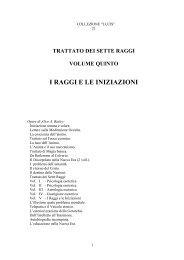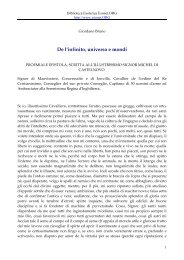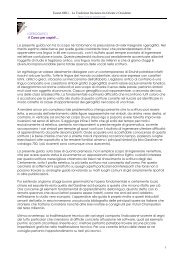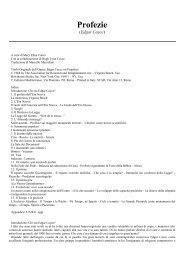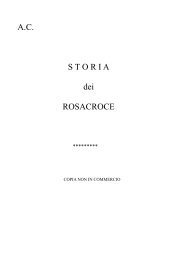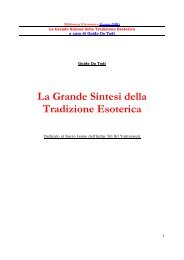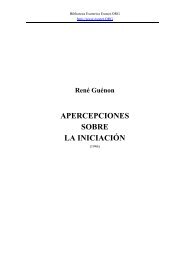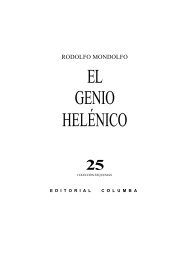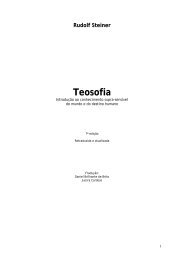Biblioteca Esoterica Esonet.ORG http://www.esonet.ORG 1
Biblioteca Esoterica Esonet.ORG http://www.esonet.ORG 1
Biblioteca Esoterica Esonet.ORG http://www.esonet.ORG 1
You also want an ePaper? Increase the reach of your titles
YUMPU automatically turns print PDFs into web optimized ePapers that Google loves.
Constitution of Man -<br />
The Physical and Psychic Bodies - 4<br />
<strong>Biblioteca</strong> <strong>Esoterica</strong> <strong>Esonet</strong>.<strong>ORG</strong><br />
<strong>http</strong>://<strong>www</strong>.<strong>esonet</strong>.<strong>ORG</strong><br />
With the assistance of what I presently shall call the concretizing mind, psychism<br />
"precipitates" as a psychic structure. The latter is a field of forces rather than a "body," yet<br />
it operates somewhat as a body. It can be called a body of desires.<br />
The term desire should be understood in its basic sense. All desires are desires for<br />
relationship with other entities, be they persons, objects or the kind of power that makes<br />
possible the possession of persons or objects (for example, money, fame, authority, and so<br />
on). In Sanskrit, desire is kama, a word with many meanings; but the English word desire<br />
also has many meanings, some positive, some negative. It can refer to love or hatred,<br />
possessiveness or repudiation. Desire also can apply to devotion and faith. In its most<br />
sublime aspect, desire is the Compassion emanating from the Godhead state; and religious<br />
cosmologies speak of the motive for the creation of the universe as God's "desire" for<br />
manifestation. The psychism experienced by the members of a tribe (and even by members<br />
of a more complex, less homogenous culture-whole) results from a powerful desire for<br />
interpersonal relatedness. This yearning is kama at work — just as the mating urge that<br />
compels male and female to embrace is life at work. Mating unites biological structures;<br />
psychic love unites the psychic "bodies" of persons.<br />
The psychic or desire body also has been called the "astral body" — a rather confusing<br />
term. Its original meaning may be understood by thinking of the sky as ancient Chinese<br />
philosophers did. The basic aim of Chinese culture was to make society ("the State") a<br />
reflection of the majestic order- revealed by the sky. Chinese familial, social, and cultural<br />
life was highly ritualized; every relationship was part of a ritual that was meant to reflect<br />
the celestial order of the stars and planets as they moved across the sky. The sky was thus<br />
the "astral body" of the Chinese state, and the emperor and his astrologers tried to make<br />
sure that the complex interplay of family and social relationships would reflect celestial<br />
order. They used "music, rites, and chastisements" to accomplish this end. Similar means<br />
traditionally have been used in the West: the deliberate arousal of religious faith,<br />
observances of various kinds, and moral or sociocultural sanctions, including<br />
excommunication and (under the Inquisition) torture — all of which were intended for the<br />
sake of the soul.<br />
What was meant by "soul" in this case was none other than the astral body or psychic<br />
self — the body of desires. Culture and religion were meant to transmute the desires of the<br />
person — the sociocultural unit — from selfish and biologically impelled desires to the<br />
desire for salvation through faith, altruism, and neighborly love. The purpose of devotion<br />
to Christ or to the Church, in India to a guru, was the transformation of the many desires<br />
for possessive and satisfying relationships into one single stream with a spiritual object. At<br />
the lower level of psychic desire, the soul was called the "animal soul" or less pejoratively,<br />
the "living soul"; its highest level was termed the "divine soul." In most human beings the<br />
soul was torn by a crucial conflict between the animal and the divine; the results of such a<br />
conflict during a person's life span determined, after a symbolic "Judgment," what the<br />
103



